The Art of Rewatching Game of Thrones: A Comprehensive Analysis
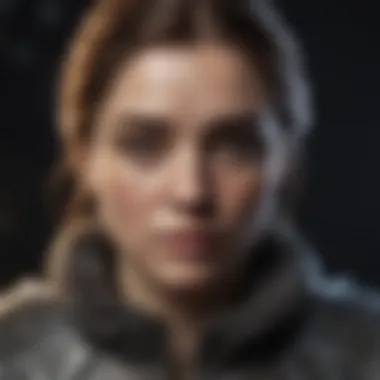
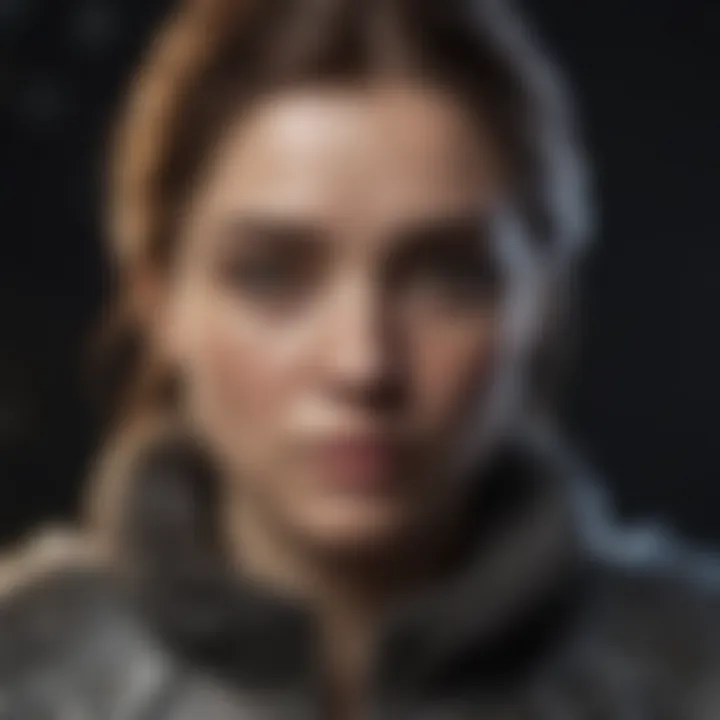
Intro
Rewatching a series like Game of Thrones reveals layers of complexity that often remain hidden during a first viewing. The series is rich in narrative, character intricacies, and thematic depth. For many fans, a single pass through the story is not enough to grasp all the details and nuances. Engaging in multiple viewings allows viewers to appreciate the subtleties that enrich the overall experience. This article aims to guide fans through this fascinating journey by examining critical aspects such as character dissection, episode breakdowns, lore exploration, and fan theories.
Let us begin this analysis with the examination of key characters.
Character Dissections
Detailed Analysis of Key Characters
In Game of Thrones, characters are not simply archetypes; they are intricate beings shaped by their environments and experiences. Ned Stark stands as a symbol of honor, yet his rigid morality places him in precarious situations. Cersei Lannister, on the other hand, represents ambition and cunning, often using Machiavellian tactics to achieve her goals. Analyzing their motivations and choices through rewatching can illuminate their complexities and flaws, providing more context to their actions.
Character Development Throughout the Series
The growth of characters like Jaime Lannister is particularly noteworthy. Initially portrayed as arrogant and self-serving, his journey reveals a deeper moral struggle and transformation. Contrast this with characters such as Sansa Stark, who evolves from naivety to a shrewd political player. Understanding these developments heightens the viewer’s appreciation for the series.
Impact on the Overarching Storyline
The decisions made by characters directly affect the narrative trajectory. Daenerys Targaryen, as she shifts between liberator and tyrant, prompts crucial questions about power and morality. Each rewatch allows fans to observe how these arcs subtly intertwine, forming a cohesive narrative that reflects the series' themes of loyalty, power, and betrayal.
Episode Breakdowns
Recap of Significant Events in Each Episode
Every episode of Game of Thrones holds moments that are pivotal to the series. By reviewing each episode's key events, viewers can recognize the foreshadowing or callbacks that resonate in later seasons. The infamous Red Wedding, for example, serves as a turning point for many characters and is filled with tense moments that warrant further inspection.
Exploration of Themes and Symbolism
Themes such as the corruption of power and the nature of loyalty run throughout the series. Rewatching can unveil symbols, such as the importance of dragons as both a source of strength and a harbinger of destruction. These thematic elements add depth and invite viewers to reflect on broader societal implications.
Key Moments and Their Implications
Moments like Bran's fall or the unveiling of Jon Snow’s parentage have significant ramifications. Revisiting these events can foster a deeper understanding of their implications within the context of the series and its characters' arcs.
Lore Explorations
Delving Into the Rich History and Lore of Westeros
Game of Thrones is built on a vast foundation of history and lore detailed within George R.R. Martin’s books. Each rewatch can reveal how the series interlaces elements from its backstory. The history of the Targaryens, for instance, provides important context for Daenerys' journey and her connection to dragons.
Uncovering Hidden Details and Connections
Subtle references and Easter eggs are often only apparent on second or third viewing. Noticing items such as the Stark banner in various locations can invoke discussions about loyalty and the cost of ambition. The show rewards observant viewers, unraveling interconnections that might go unnoticed initially.
Exploring the Cultural and Mythical Aspects
The mythical creatures and prophecies within the series contribute to its depth. The relevance of the Weirwood trees and ancient magic outline the essence of the world. Exploring these elements unveils why certain choices, like Bran becoming a Three-Eyed Raven, hold importance.
Fan Theories
Compilation of Popular and Intriguing Fan Theories
Fans of Game of Thrones have developed a wealth of theories ranging from character fates to unexplained happenings. Some believe that Lady Stoneheart, a resurrected Catelyn Stark, will impact future plot lines. Others speculate about the fates of characters such as Gendry.
Evaluation of Theories Based on Evidence from the Show
Analyzing these theories in the context of the episodes provides further appreciation for how intricate the storytelling is. Many of them tie back to hints and foreshadowing present in earlier seasons, reinforcing the depth of planning behind the series.
Speculation on Future Plot Developments
While the series has concluded, the lore still invites speculation. Theories about the fate of Westeros and its remaining characters provide ample material for discussion. Reflecting on these post-show would enhance the experience for fans and engage them in ongoing dialogue.
"Game of Thrones is not just a story of wars; it is a story of people, choices, and the consequences that echo through history."
By embracing the complexities found within the series, rewatching Game of Thrones stands as an enriching method to deepen one’s understanding and appreciation of its narrative intricacies. Through a focus on character, episode significance, lore, and fan interpretations, we uncover a more profound insight into this expansive universe.
Foreword to Rewatching
Rewatching a series like Game of Thrones provides viewers with a unique opportunity to delve deeper into its complex narrative and rich character arcs. This practice allows fans to perceive elements that may have gone unnoticed during a first viewing. Beyond mere entertainment, this article examines the significance of rewatching as a means to foster a deeper appreciation for the series.
Through rewatching, viewers can identify recurring themes, motifs, and subtle character developments that strengthen their understanding of the show's intricate world. Each episode can reveal something new, whether it's a hidden plot point or a nuanced performance. The habit of rewatching can unveil layers of meaning that can enhance the viewing experience significantly.
Defining Rewatching
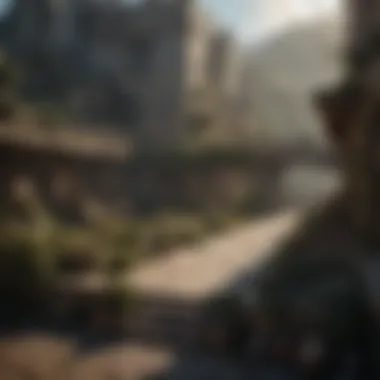
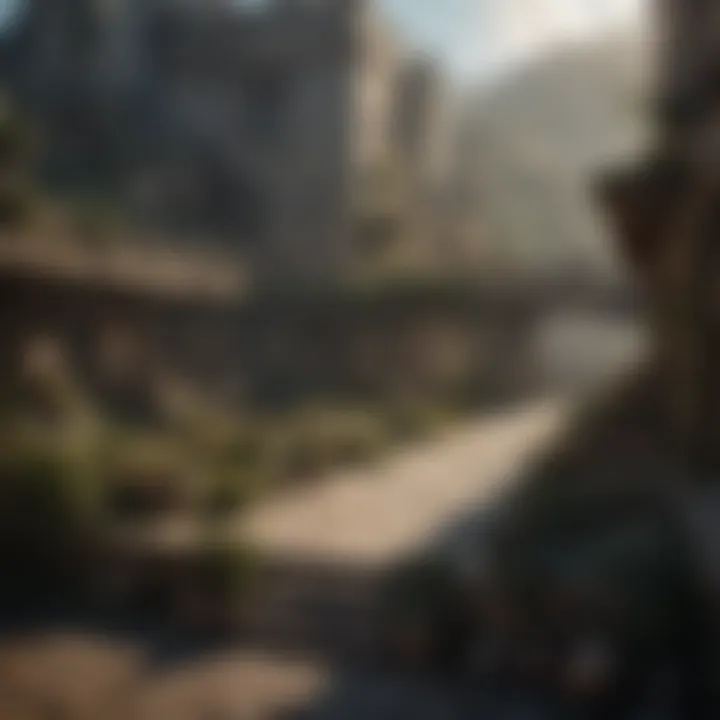
Rewatching is the act of viewing the same content multiple times, allowing for deeper engagement with the material. In the context of Game of Thrones, rewatching transcends simple repetition; it is an analytical process that prompts viewers to evaluate the storyline and elements of storytelling in greater depth. This intentional viewing can lead to discovering foreshadowing, symbolism, and connections between characters that were not apparent in initial viewings.
Popularity of the Series
The immense popularity of Game of Thrones cannot be overstated. Since its debut, the series has garnered a diverse and passionate fanbase that spans across the globe. The combination of grand storytelling, complex characters, and a richly crafted universe has propelled Game of Thrones to cultural prominence.
The series' intricate plots require attention, leading many fans to revisit the show multiple times. Additionally, the social aspect of watching and discussing the series with friends or family drives rewatching behavior, as viewers often seek community validation or detailed discussions about the show's nuances.
"Rewatching 'Game of Thrones' is not merely nostalgia; it is a journey back to a world filled with layers of meaning and complexity."
In summary, the act of rewatching Game of Thrones acts as both a personal reflection on the plot and an opportunity to engage in broader cultural discourse. This aspect underpins the significance of exploring the depths of the series, making it an essential practice for devoted fans.
Narrative Structure and Complexity
Understanding the narrative structure and complexity of Game of Thrones is essential to appreciating its depth. The series, based on George R. R. Martin's book series, intricately weaves multiple narratives together. Each storyline contributes to an overall mosaic that enriches the viewing experience, especially upon rewatching. This article examines several vital elements like plotlines, foreshadowing, and character arcs that make the series compelling.
Multiple Plotlines
One of the hallmarks of Game of Thrones is its vast array of plotlines. Each character has their own journey, often intersecting with others in unexpected ways. For example, the Stark family story contrasts sharply with the Lannisters’ ambitions. Initially, viewers might focus on the central characters, such as Jon Snow and Daenerys Targaryen. However, a second viewing reveals how minor characters contribute significantly to these narratives.
The series balances these multiple plotlines effectively, allowing for cliffhangers and resolutions that keep viewers engaged. The richness of the narrative becomes apparent when fans realize that seemingly insignificant scenes laid groundwork for major events later on. The importance of rewatching lies in recognizing these connections that initially went unnoticed.
Foreshadowing and Chekhov's Gun
Foreshadowing is another critical aspect, and it often goes hand-in-hand with the narrative structure. Chekhov's Gun concept applies directly here; if something is included in the story, it will eventually serve a purpose. The series is replete with examples where small details lead to significant outcomes. When you rewatch, those earlier hints become more pronounced, heightening the viewer's appreciation for the show's creators.
For instance, early mentions of Valyrian steel not only serve as worldbuilding but also signal critical plot points concerning major battles. Recognizing these elements on a rewatch enhances your understanding of the narrative and cements its complexity.
Character Arcs and Development
Character development serves as a backbone to the rich narrative structure in Game of Thrones. Characters like Tyrion Lannister or Cersei Lannister undergo substantial transformations throughout the series. In early seasons, viewers might view Tyrion as a clever but marginalized figure. However, by the end, his moral and ethical complexities unfold. A rewatch allows fans to trace these arcs in greater detail, noting decisions and events that foreshadow final outcomes.
Each character is a building block in the series' overarching narrative. Diverse perspectives contribute to the multifaceted storytelling that makes Game of Thrones unique. Moreover, a focus on character arcs reveals a deeper emotional and ethical complexity, encouraging viewers to contemplate not just the actions but also the motives behind them.
"The narrative structure of Game of Thrones is like a complex tapestry, where each thread interconnects to create a larger picture."
Through focused analysis of its narrative structure and complexity, Game of Thrones proves itself as a rich text worthy of reanalysis. Characters evolve, plotlines intertwine, and foreshadowings become clear upon deeper examination. This level of complexity encourages fans to rewatch, revealing layers that enhance the understanding and enjoyment of the series, ultimately showcasing the artistry involved in storytelling.
Character Analysis in Rewatching
Analyzing characters through multiple viewings of Game of Thrones is pivotal for understanding the series’ intricate layers. Each character undergoes significant evolution, and their development often reflects larger themes within the story. By focusing on character analysis, viewers derive deeper insights into motivations, relationships, and outcomes. This approach can lead to a richer appreciation of the narrative and its complexities.
The Evolution of Key Characters
Key characters in Game of Thrones showcase remarkable progression throughout the series. Characters such as Daenerys Targaryen and Jaime Lannister transform in ways that invite viewers to reconsider their perceptions.
For instance, Daenerys begins as a timid girl under her brother’s control, but she evolves into a powerful leader. This transition is not just about gaining power; it raises questions about the consequences of ambition and control. Watching her journey again allows viewers to notice subtle shifts in her character, emphasizing her struggles with morality and legacy.
Similarly, Jaime Lannister's path from an arrogant knight to a man seeking redemption illustrates a complex portrayal of honor and shame. His relationships, particularly with Brienne of Tarth, highlight the contrast between personal desires and societal expectations. Rewatching the series exposes how these character arcs relate to the overall themes of power and the human condition.
Understanding Antagonists
Antagonists in Game of Thrones are not merely villains; they often possess layers that justify their actions. Characters like Cersei Lannister and Ramsay Bolton serve as both obstacles and mirrors to the protagonists.
Cersei's thirst for power is often driven by her protective instincts for her family. Rewatching her scenes allows viewers to witness how her past shapes her decisions. This offers a deeper understanding of her motivations, revealing her vulnerabilities. Meanwhile, Ramsay represents the extreme of savagery and chaos, but his character also prompts discussions about nature versus nurture. What makes a character like him?
Understanding these antagonists invites viewers to question ethical lines and what it means to be 'good' or 'evil'.
The Role of Minor Characters
Minor characters in Game of Thrones contribute substantially to the narrative, even if they receive less screen time. Characters like Sandor Clegane, Petyr Baelish, and Oberyn Martell add richness to the storyline.
For instance, Sandor, often seen as brutish, displays moments of complexity and unexpected depth, especially in his interactions with Arya Stark. This showcases themes of survival and moral ambiguity. On the other hand, Petyr Baelish, also known as Littlefinger, is a master of manipulation and chaos. His machinations provide insights into the nature of power dynamics, making rewatching critical for understanding the repercussions of his actions.
Furthermore, minor characters often reflect the larger societal issues present in the world of Westeros. Analyzing their roles through repeated viewings helps to contextualize the environment in which the central characters operate.
"In every character lies a plethora of stories untold, waiting for observers to unveil their depths through the lens of time."
Themes and Motifs
Rewatching Game of Thrones reveals a rich tapestry of themes and motifs that profoundly shape the viewer's experience. These thematic elements serve not only as narrative anchors but also as lenses through which to understand character motivations and plot developments. The depth of these themes becomes more apparent with repeated viewings, as each episode unravels its layers while engaging viewers in a critical dialogue about morality, power, and the human condition.
Power and Corruption
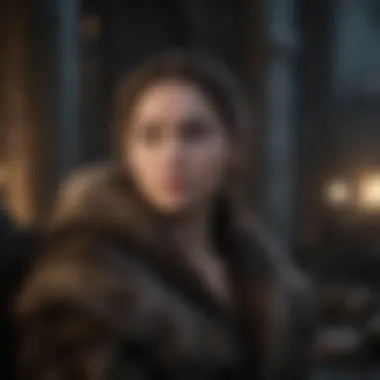

The theme of power and its corrupting influence is pervasive throughout the series. From the initial struggle for the Iron Throne to the subplots involving houses vying for control, the consequences of power are depicted with stark realism. Characters like Cersei Lannister and Petyr Baelish illustrate how ambition can lead to moral decay. Observe their decisions, and you will notice a consistent pattern of betrayal and manipulation.
Viewing this theme through different lenses during rewatching allows fans to appreciate the complexity further. It's not simply about gaining power; it is about how that power distorts values and relationships. The show raises questions about the ethical implications of seeking power. As rewatchers, we can consider: does power itself corrupt, or does it merely reveal the true nature of those who wield it?
Honor vs. Pragmatism
The conflict between honor and pragmatism is a recurring motif that underscores many character dilemmas. Characters like Ned Stark epitomize the struggle to uphold honor in a world riddled with pragmatism, often at the cost of their lives. Conversely, others like Tywin Lannister embody a more ruthless, practical approach to leadership. This debate is particularly poignant in a narrative that challenges traditional notions of heroism.
During rewatching, the nuances of this theme become clearer. Observing how characters advocate for their beliefs reveals the moral ambiguity of their choices. This invites contemplation on what it means to be noble in a world that often rewards cunning and ruthlessness. The deeper one engages with these dilemmas, the more they can appreciate the series' commentary on ethical compromises in human behavior.
Destiny and Free Will
The interplay between destiny and free will is another critical theme that invites deeper analysis. Characters grapple with their fates as prophecies and foretellings shape their paths. Take Daenerys Targaryen, for instance; her journey is influenced by both personal ambition and the expectations placed upon her by others. However, her choices frequently collide with the weight of destiny.
Rewatching allows viewers to dissect how the concept of fate impacts character decisions and ultimate outcomes. Are characters like Jon Snow trapped by destiny, or do they forge their paths through their decisions? This theme encourages viewers to think about the extent of agency within the confines of predictable arcs, leading to a richer understanding of the narrative’s philosophical inquiries.
Ultimately, the recurrent exploration of these themes and motifs serves not only to guide character development but also to evoke deeper questions about morality, society, and the individual’s role within it, making rewatching an invaluable tool for fans seeking insight.
The Role of Worldbuilding
Worldbuilding in Game of Thrones serves as a vital framework for the entire narrative. It creates a rich tapestry that connects characters, events, and themes, drawing viewers into its complex universe. The geographical and cultural aspects not only enhance the story but also affect character motivations and conflicts. An immersive world allows viewers to grasp the stakes more profoundly, making the rewatching experience rewarding. Rewatching provides an opportunity to catch subtle details embedded in the world, from the design of its landscapes to the varied traditions of its inhabitants.
Geographic and Cultural Depth
The intricate geography of Westeros and Essos is a key element of the Game of Thrones universe. The relationships between different regions are not merely backdrops; they are active participants in the story. For example, the cold, harsh climate of the North shapes the Stark family's values and identity, while the opulence of the South influences the politics of King’s Landing. During a rewatch, fans can notice geographic influences on events and characters, enhancing their understanding of decisions made throughout the series.
Cultural depth goes hand-in-hand with geography. Each house and region possesses distinct cultural norms and values. The traditions of the Dothraki differ starkly from those of the Lannisters. These cultural differences create a fertile ground for conflict. Viewers often overlook these cultural nuances during a first viewing, but they become apparent upon rewatching. They offer layers of meaning to the story and illuminate characters’ motivations.
Mythology and Lore
Mythology and lore enrich the narrative, weaving backstories that add texture to the main tale. Game of Thrones is steeped in a rich history, from the legends of the First Men to the tales of the Targaryens. These stories are often hinted at throughout the series, allowing for deeper exploration during a rewatch. Notably, characters often reference historical events or legends that influence their actions. Understanding these events can drastically alter how viewers perceive character motivations and the unfolding plot.
Incorporating these elements into the rewatching process makes for a more engaging experience. Each viewing can uncover hidden layers of the story. Conditions in the world of Westeros are shaped not only by current political struggles but also by past events. This layered storytelling creates an opportunity to view contemporary conflicts in light of historical precedents, yielding a more profound understanding of why characters behave as they do.
"Worldbuilding is not just about creating places. It's about building a world that feels alive, affecting both the characters and the audience."
Psychological Elements of Rewatching
Rewatching Game of Thrones provides a profound glimpse into the psychological dimensions that shape viewer experiences. This exploration allows fans to engage with the series on multiple levels, revealing nuances that first-time viewers may overlook. Understanding these psychological elements enhances appreciation for the storytelling craft and deepens emotional connections with characters and themes. Two primary psychological aspects play significant roles in this analysis: cognitive dissonance and nostalgia.
Cognitive Dissonance
Cognitive dissonance occurs when viewers experience conflicting thoughts or emotions during the rewatching process. Fans of Game of Thrones may find themselves grappling with their opinions on character motivations and plot resolutions, especially given the series' complex narrative. For instance, one might have once rooted for a character during their initial viewing only to find them morally ambiguous or even detestable upon revisiting key moments. This internal conflict can provoke a reevaluation of personal beliefs regarding heroism and villainy.
The act of rewatching invites a more analytical approach to comprehension. As fans re-examine pivotal scenes, they might unearth motivations that were not apparent during the first viewing. The series prompts viewers to confront biases and question their understanding of morality, loyalty, and justice. Engaging with these dissonant feelings can lead to richer discussions among fans, fostering a broader understanding of Game of Thrones
"The mind is inherently restless in seeking coherence amid dissonance."
One way this cognitive dissonance manifests is through changing perceptions of characters. For example, many fans initially hold Jaime Lannister in contempt due to his actions. However, subsequent viewings might reveal layers of complexity that elicit sympathy or understanding. This evolution in perception illustrates how the series encourages viewers to reassess their initial judgments based on newfound information.
Nostalgia and Emotional Resonance
Nostalgia plays a vital role in the rewatching experience for Game of Thrones enthusiasts. Returning to familiar landscapes, dialogue, and character arcs can evoke powerful sentiments. This emotional resonance is particularly significant when viewers reflect on their initial experiences of discovering the series. Rewatching allows individuals to relive those moments, providing comfort or a sense of connection to past experiences. The fondness for specific scenes or characters can create a powerful emotional draw, further motivating viewers to embark on their rewatching journey.
The emotional impact of the series cannot be underestimated. Themes of loss, betrayal, and triumph resonate deeply with viewers. Key episodes evoke strong sentiments that are often revisited, making the rewatch not just an analytical endeavor but an emotional one. Fans may find themselves revisiting episodes that showcase character sacrifices or unexpected reunions, amplifying the emotional stakes.
In summary, appreciating the psychological elements of rewatching Game of Thrones offers profound insights into viewer engagement. Cognitive dissonance encourages critical thought and reevaluation of character arcs while nostalgia facilitates emotional connections. Together, these elements enrich the experience and enhance understanding of one of television's most complex narratives.
Fan Theories and Reinterpretations
Rewatching Game of Thrones invites more than just a narrative experience; it opens the door to fan theories and reinterpretations that enrich the overall understanding of the series. Engaging with these theories allows viewers to appreciate various elements of the story that might have been overlooked or misinterpreted during a single viewing. The idea of fan theories is rooted in community engagement, where audiences take the time to analyze and discuss details that contribute to a more profound comprehension of characters, plots, and themes.
The fabric of Game of Thrones is complex, intertwining character motivations and broader themes that can change meaning over time. The discussions and debates sparked by fan theories help to foster a culture of analysis and critical thought, providing fans with the tools to navigate the intricate narrative world created by George R.R. Martin and executed on screen by David Benioff and D.B. Weiss.
The Impact of Fandom on Rewatching
Fandom plays a crucial role in the rewatching experience, shaping not only how individuals perceive the story but also how they connect with each other. The discussions that arise within fan communities—whether on forums like Reddit or social media platforms—often focus on critical scenes, ambiguous character actions, and unresolved plot lines. This shared engagement transforms rewatching into a communal activity, where interpretations are tested and new perspectives are formed.
By diving into various fan theories, viewers can enhance their understanding of character arcs and deepen their emotional responses. Moreover, fandom can also influence collective memory; groups may remember events differently based on their discussions. This phenomenon brings a richer texture to rewatching, as fans piece together connections that they might have missed the first time.
Common Fan Theories and Their Origins
Fan theories can often serve as a mirror reflecting the enthusiasts’ interpretations and hopes regarding the narrative. This section delves into some of the common theories that have emerged over the years, providing context on their origins and the intellectual curiosity they inspire among fans.
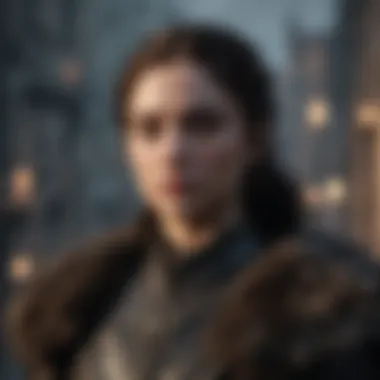

- Jon Snow's Parentage: One of the most discussed theories involves Jon Snow's true parentage, suggesting he is the son of Lyanna Stark and Rhaegar Targaryen. This theory transforms his identity and uplifts his role in the series dramatically.
- Lady Stoneheart: Introduced in the books but missing in the series, some fans speculate on the potential inclusion of Lady Stoneheart in future narratives, raising questions regarding justice and revenge in the story.
- Gendry's Destiny: Gendry, as a legitimized son of Robert Baratheon, is theorized to potentially play a significant role in the fight for the throne, linking back to pivotal events from earlier seasons
The emergence of these theories demonstrates how passionately fans engage with the material. They not only speculate on the narrative but also provide alternative pathways that challenge conventional interpretations.
Engaging with fan theories not only enhances individual viewing experiences but also fosters a community of shared exploration.
Each view of the series becomes an invitation to rethink what has been presented, allowing for a continuous exploration of its depths.
The Experience of Watching in Groups vs. Solo
Rewatching Game of Thrones can be an experience that varies significantly based on whether you engage with it alone or in a group. This difference influences how one perceives the plot, characters, and themes. Understanding this distinction is crucial as it can greatly enhance the viewing experience and reveal layers of the narrative that might be missed when watching alone.
Social Context and Discussions
Watching Game of Thrones in a group introduces a social dynamic that transforms the viewing process into more than just passive consumption. When multiple viewers gather, they create a platform for dialogue. This can lead to deeper interpretations and insights that individual viewers might not consider. Group discussions often provide a multifaceted view of the series.
- Shared Reactions: Observing how others respond to key scenes—whether it’s gasps during a surprising twist or laughter at a memorable line—can amplify the viewing experience. It makes the encounter memorable.
- Diverse Perspectives: Different opinions and backgrounds bring fresh angles to discussions about character motivations, plot developments, and thematic elements. This variety encourages viewers to question their interpretations and engage critically with the story.
- Community Bonding: Sharing the experience can strengthen relationships, whether among friends or in fan communities. Engaging in these discussions afterward on platforms like Reddit or Facebook can further solidify that sense of belonging.
Personal Reflection and Analysis
On the other hand, viewing Game of Thrones solo allows for introspection. It provides an opportunity for viewers to engage with the material in a personal manner. This solitary experience can foster a deeper individual connection to the narrative.
- Focus on Details: Without the distraction of others, viewers often pick up on subtleties—like hidden character motivations or nuanced foreshadowing—that may go unnoticed in a communal setting.
- Emotional Engagement: Watching alone might encourage viewers to connect emotionally with the characters. One may find themselves contemplating difficult questions around morality and power that the show poses, facilitating a deeper understanding of the series' complexity.
- Revisit and Reflect: Solo watching allows for pausing and rewinding, enabling viewers to digest significant moments fully. Having the control to examine specific scenes enhances analytical thinking and personal insight.
Critical Reception and Rewatching
Rewatching a show like Game of Thrones is not just a casual activity. It becomes a complex understanding of how critical reception influences our viewing experience. The reactions from critics and fans can shape, often dramatically, our perceptions of the series. When individuals revisit the show, they do so with the awareness of how it was received at its initial airing. This context allows viewers to dissect scenes, character arcs, and plot developments with a more nuanced lens.
The significance of critical reception lies in its ability to provide insight into the production choices made by the creators. Reviews often highlight specific storytelling elements that might have been overlooked during a first viewing. Understanding these critiques allows a deeper exploration of the thematic fabric of the narrative. In turn, this enriches the overall viewing experience.
When rewatching, fans may recognize familiar criticisms and praises. They often form a more personal connection to the material as interpretations shift. Some narratives that once felt unsatisfying can reveal themselves in new lights.
Moreover, discussions around the series have evolved over time. From its original broadcast to the present moment, opinions have transformed. This gradual change in perspective can profoundly impact how a viewer engages with the series during subsequent viewings.
As rewatching solidifies its importance in the fandom, understanding the context of critical reception offers clearer lenses through which to assess the series. It becomes a study in the intersection of media, audience perception, and cultural dialogue.
Changing Perspectives Over Time
The ability to rewatch Game of Thrones reveals the evolving narrative landscapes shaped by both fans and critics. During the series' airing, opinion shifted considerably from season to season. Some seasons received acclaim while others faced backlash. As the series concluded, many began reassessing earlier seasons based on the retrospective understanding of the full narrative arc.
This changing perspective impacts individual reinterpretations. For instance, a character who initially seemed morally straightforward may reveal layers of complexity that were obscured in the first viewing. Understanding these shifts can illuminate discussions among fans and guide a deepened appreciation of the characters' trajectories.
Moreover, as societal views develop, viewers might find relevance in issues reflected in the series that resonate with current cultural climates. Questions surrounding power, loyalty, and betrayal take on different meanings as political sentiments evolve, prompting fans to reassess their engagement with the text.
Cultural Context Influence
Cultural significance plays a vital role when rewatching Game of Thrones. The world of the series is a mirror to various contemporary societal issues, and as these issues change, so does the viewing experience. Core themes—such as power struggles and the consequences of ambition—are understood differently as they intersect with real-world contexts.
Viewers in different eras or regions may connect with different aspects of the show based on their cultural backgrounds. For example, themes of authoritarian governance could hold new meanings in light of current political climates, influencing reactions to decisions made by characters like Cersei Lannister or Daenerys Targaryen.
Engaging with Game of Thrones after significant cultural events can bring unique insights. The discourse about gender, race, and ethics surrounding the series often sparks spirited discussions among diverse audiences. Each rerun evolves into a communal exploration of values, ethics, and personal mindsets as shaped by changing societal landscapes.
Ultimately, rewatching becomes more than just an indulgent pastime; it opens doors to understanding cultural narratives and encourages deeper conversations about the reflections presented in art.
Ending on the Value of Rewatching
Rewatching Game of Thrones is not merely a recreational activity. It serves various significant purposes, enhancing the viewing experience in ways single sittings cannot achieve. The series, rich in narrative intricacies and character depth, warrants revisitation for a more profound understanding and appreciation.
One key element to consider is how repetition reveals layers of plot and character development that might be missed initially. The series is known for its complexity, with numerous plotlines intricately woven together. By revisiting episodes, viewers can track these threads more effectively, recognizing the implications behind decisions made by characters. This depth of insight turns a mundane rewatch into an illuminating journey.
Moreover, rewatching allows fans to appreciate the subtleties within dialogues and interactions. Many lines hold significance that only becomes apparent after following through the show’s evolution.
In doing so, we can better grasp the overarching themes of power struggle, morality, and human nature. Thus, the conclusion is clear: rewatching enriches our understanding significantly.
"Rewatching is not just about entertainment; it's an exploratory journey through the minds of characters and the fabric of narratives."
Summarizing Key Insights
The analysis of Game of Thrones through rewatching has illuminated several core insights:
- Complexity of Narrative: Characters and plots interlace, creating a tapestry that requires attention over multiple viewings.
- Character Growth: Observing the evolution of key characters like Daenerys Targaryen and Jon Snow offers a fresh perspective on their motivations and choices.
- Theme Exploration: Recurring themes such as power and morality reveal deeper meanings when analyzed more than once.
- Psychological Engagement: The emotional resonance that comes through rewatching helps fans connect more profoundly with the material.
These insights demonstrate that the act of rewatching is more than just repetition. It is a critical analysis that enhances our appreciation of storytelling.
Future Implications for Viewers
Understanding how to engage with Game of Thrones in a rewatching context sets a precedent for future viewing experiences. Here are some implications:
- Enhanced Viewing Skills: Viewers may develop sharper analytical skills, enabling them to critically assess narrative structures in other series.
- Community Discussions: Rewatching sessions can foster discussions among fans, deepening bonds within the community as interpretations are shared and debated.
- Appreciation of Production Value: As viewers watch repeatedly, they often recognize the writers' and directors' efforts more clearly, enhancing the viewing experience.
- Foundation for New Content: Rewatching may develop a desire for a deep dive into new series or films that exhibit similar complexities.
Ultimately, the implications extend beyond Game of Thrones and influence how viewers engage with series in general. The art of rewatching opens up avenues for learning and discovery.



